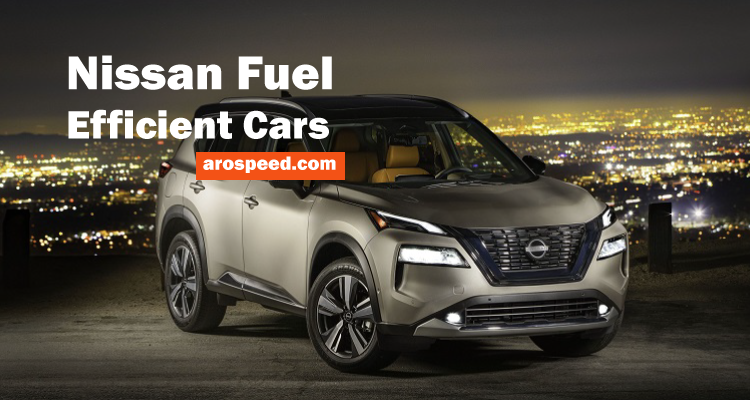There is a growing need for fuel-efficient automobiles in a world where rising fuel prices and environmental conscience go hand in hand. Automakers are reacting to consumer demand for vehicles that maximize fuel efficiency and reduce carbon footprint by developing inventive solutions. Nissan is one of the best among them, offering a good range of stylish, eco-friendly, and fuel-efficient vehicles. In this article, we’ll delve into Nissan fuel efficient cars, exploring their key models and the technologies that drive them.
| Model | Fuel Efficiency (Combined MPG) |
| Nissan Leaf | Up to 226 miles (EPA) |
| Nissan Versa | Up to 35 |
| Nissan Altima | Up to 32 |
| Nissan Rogue | Up to 31 |
| Nissan Kicks | Up to 33 |
| Nissan Sentra | Up to 33 |
| Nissan Murano | Up to 24 |
| Nissan Maxima | Up to 24 |
Table of Contents
Nissan’s Green Vision
Nissan has always been at the forefront of sustainable transportation, being a pioneer in the automobile industry. The corporation has made significant investments in R&D with the goal of creating a more sustainable future. The result is a line of Nissan fuel efficient cars that meet a variety of consumer demands. Nissan is dedicated to sustainability, which extends beyond fuel efficiency and includes electrification, recycling, and minimizing the impact on the environment overall.
Key Technologies Driving Fuel Efficiency
Nissan e-Power Technology
Nissan’s e-Power technology is one of their innovations in the fight for fuel economy. Nissan’s e-Power technology drives the wheels alone with an electric motor, in contrast to traditional hybrid systems. Here, the gasoline engine serves just as an electric motor’s power generator, making for a smooth driving experience. This technology is a sensible option for people who might not have easy access to charging stations because it does not require an external charging infrastructure.
ProPILOT Assist
Nissan’s ProPILOT Assist is a cutting-edge driver assistance technology intended to reduce stress and increase comfort when driving on the highway. ProPILOT Assist, although not a fuel economy technology per se, can help reduce fuel consumption by assisting drivers in maintaining a constant speed and distance from other cars, hence optimizing fuel use when traveling on highways.
Aerodynamic Design
Nissan has made significant investments in aerodynamic design to lower drag and boost fuel economy throughout its range. Careful aerodynamic shape helps every Nissan model, from the sporty Nissan Altima to the little Nissan Versa, cut through the air more effectively. This meticulous attention to detail results in a quieter, more comfortable ride in addition to improved Nissan fuel efficient cars.
Top 5 Nissan Fuel Efficient Cars
Nissan Leaf
The Nissan Leaf, a pioneer in the electric vehicle (EV) market, has raised the bar for driving with no emissions. The Leaf is a great option for environmentally conscious commuters because to its remarkable range on a single charge and entirely electric drivetrain. The Leaf is Nissan’s pledge to provide sustainable mobility as the world’s charging infrastructure expands.
Nissan Versa
In the compact vehicle class, the Nissan Versa distinguishes out because to its economical and fuel-efficient design. Without sacrificing comfort or flair, the Versa achieves exceptional fuel efficiency thanks to its streamlined form and effective powertrains. For city people looking for a dependable and affordable smart vehicle, it’s a sensible option.
Nissan Altima
The Nissan Altima, which belongs to the midsize car segment, blends style with fuel economy. Modern Altima models come equipped with cutting-edge engine technology, such as variable compression turbo (VC-Turbo) engines that adjust power and economy according to road conditions. This technical advancement is a prime example of Nissan’s commitment to increasing conventional internal combustion engine fuel economy.
Nissan Rogue
Families looking for a crossover SUV with plenty of room and good fuel economy have found great success with the Nissan Rogue. Fuel efficiency and performance are balanced in the Rogue because to its aerodynamic design and economical powertrains. For longer trips, the availability of ProPILOT Assist in some trims adds another level of ease.
Nissan Kicks
Nissan’s subcompact crossover, the Kicks, is a flexible example of the company’s dedication to fuel efficiency. Excellent fuel economy is a result of its lightweight construction and compact size, which makes it a great option for urban commuters who prioritize agility and efficiency. To further improve the driving experience, Nissan’s Intelligent Mobility technologies are also included in the Kicks.
Consumer Benefits and Economic Impact
The advantages of purchasing a fuel-efficient Nissan car extend beyond the obvious reduction in gasoline usage. Over time, owners of Nissan fuel efficient cars see considerable savings due to the growing cost of fuel. Furthermore, lower carbon emissions support the global movement towards sustainability by creating a healthier environment.
Furthermore, tax reductions and incentives for environmentally friendly automobiles are being offered by governments and municipalities worldwide more often. Nissan fuel efficient cars owners may be eligible for these incentives, which would increase the vehicles’ economic appeal.
Challenges and Future Outlook
Even though Nissan has improved its fuel efficiency significantly, there are still issues. Electric vehicles are gaining traction as the automobile sector undergoes a revolutionary change. Nissan continues to balance the development of electric and hybrid technologies in order to accommodate a wide range of consumer preferences, even if the Leaf gives the business a significant competitive advantage in the EV market.
Nissan is well-positioned to maintain its dedication to fuel efficiency and sustainability in the future. We may anticipate more advancements in manufacturing techniques, materials, and powertrains as technology develops, which will result in increasingly greener automobiles.
Nissan’s Ongoing Commitment to Innovation
The Electric Evolution
Nissan’s continued efforts in the electric vehicle, or EV, market are arguably the clearest example of their dedication to sustainability. With every version, same like Honda, the Nissan Leaf, a symbol of the electric vehicle revolution, has changed. More range, quicker charging times, and improved connection are examples of recent improvements.
Because of the Leaf’s popularity, Nissan has increased the number of electric vehicles it offers. According to reports, Nissan is actively developing new electric vehicles that will use cutting-edge battery technology for increased performance and range. This demonstrates Nissan’s commitment to taking the lead in the expanding electric car industry.
Hybrid Horizons
Apart from all-electric cars, Nissan is still improving its hybrid lineup. Due to its distinct approach to hybrid propulsion, the e-Power technology, which was first seen in the Nissan Note and Serena in various regions, has attracted attention. With its ability to bridge the gap between totally electric cars and traditional internal combustion engines, this technology might provide a versatile solution for a range of driving requirements.
We may expect hybrid systems to be included into Nissan’s fast but fuel efficiency portfolio as technology develops, giving customers additional options to suit their tastes and driving styles. This tactical approach reflects Nissan’s recognition that different worldwide consumers have different demands, and that there is no one-size-fits-all answer.
Sustainable Materials and Manufacturing
There is more to Nissan fast fuel efficient cars than just the engine and drivetrain. Nissan is continuously investigating environmentally friendly materials for use in car building and manufacturing procedures. Using eco-friendly interior materials and recycled plastics, the firm wants to lessen its carbon impact throughout the course of a vehicle’s life.
Additionally, Nissan is implementing greener techniques in its production plants. A dedication to waste reduction and investments in energy-efficient technology support the company’s larger environmental objectives. By adopting eco-friendly procedures, Nissan is exhibiting a comprehensive dedication to a cleaner future in addition to manufacturing automobiles like Toyota that are fuel-efficient.
Connectivity and Smart Mobility
The foundation of Nissan Intelligent Mobility is the company’s future plan. This program incorporates smart technologies that improve driving overall, going beyond fuel efficiency. Nissan’s vision for a safer and smarter automotive future includes advanced driver aid systems, connection features, and autonomous driving capabilities.
Nissan is aggressively investigating methods to incorporate vehicle-to-everything (V2X) communication technology into their automobiles. In addition to improving comfort and safety, this connectivity has the ability to maximize fuel economy through adaptive driving techniques and real-time data analysis.
Market Dynamics and Regulatory Landscape
The automobile sector is negotiating a challenging environment of changing customer tastes, advancing technology, and changing legal requirements. Globally, governments are enforcing more stringent pollution regulations, providing incentives for eco-friendly technology, and advocating for the shift towards electric cars. Nissan, like other manufacturers, has to adjust to these developments while making sure that its vehicles meet environmental standards across the world which also offers cheap fuel efficiency.
Infrastructure Development
The availability of a strong charging infrastructure is particularly critical to the success of electric cars. Nissan is actively working with other industry players to address this concern. To create a complete charging ecosystem, more funding for charging networks, alliances with charging service providers, and involvement in government programs are essential.
Conclusion
Nissan fuel efficient cars is evidence of the company’s commitment to sustainability and innovation. Nissan has a wide array of choices for customers looking for environmentally responsible transportation, ranging from electric cars like the Leaf to economical gasoline-powered models like the Altima and Versa.
Nissan continues to be at the forefront of the rapidly changing automotive market, embracing new trends while upholding its dedication to fuel economy. Nissan is redefining driving with technologies like e-Power, aerodynamic design, and sophisticated driver support systems, demonstrating that economy and performance can live side by side.








Comments